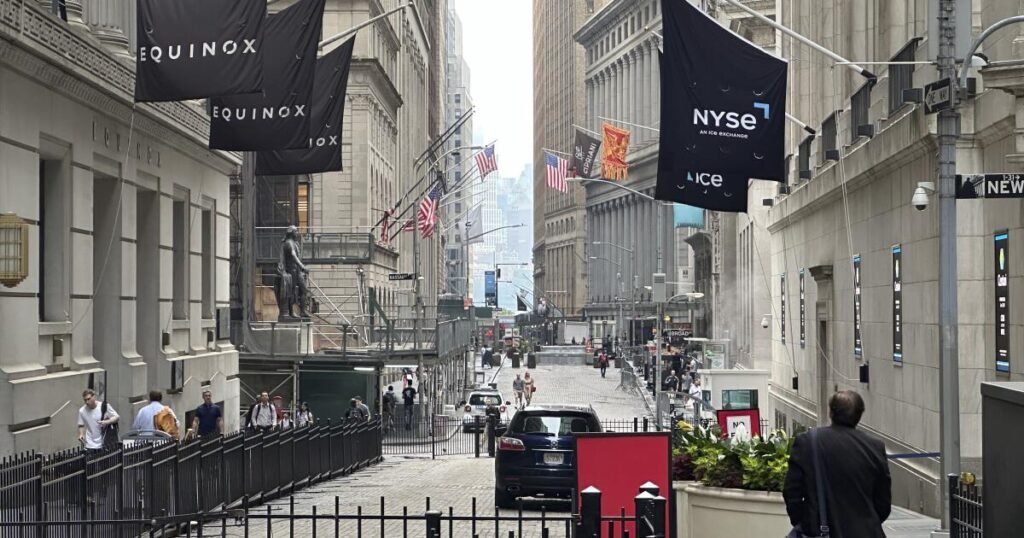U.S. stocks closed mixed on Monday, while yields surged in the bond market as the election continues to rattle financial markets around the world.
The Standard & Poor’s 500 index rose 0.3% to start a shortened four-day week that included the Independence Day holiday. The Dow Jones Industrial Average rose 0.1% and the Nasdaq Composite rose 0.8%.
The strongest performance in the world came across the Atlantic, where the CAC 40 index in Paris rose 2.8% before settling down to a 1.1% gain. The French election results suggested that the far-right parties may not win an overwhelming majority in the country’s parliamentary elections, raising hopes that the French government could enter into a deadlock, which would avoid the worst-case scenario of a far-right majority pushing through policies that would significantly increase the French government’s debt.
This is a crucial election year around the world, with voters heading to the polls later this week in the UK and soon elsewhere. In the US, pollsters are gauging the impact of last week’s debate between President Biden and former President Trump. All of this highlights “the polarization of politics and how elections drive the economy, not the other way around,” according to Nick Gentle and others in Barclays’ product management group.
Trump Media & Technology Group, whose shares have risen and fallen on the back of Trump’s possible White House entrance, rose 1% to $33.08. But shares of the company that runs Trump’s Truth social platform are still well below their all-time high of about $70 earlier this year.
The bond market was the most active of the U.S. markets. Treasury yields rose again Friday just as the Biden-Trump debate began. The growing likelihood of a Republican sweep in November sent traders back to the way they did in 2016, according to Morgan Stanley strategists. In addition to rising interest rates, traders also bought into shares of oil and gas companies and financial companies.
The yield on the 10-year Treasury note rose to 4.46% from Friday’s close of 4.39% and Thursday’s close of 4.29%, a reversal of the general trend since the spring, when the 10-year Treasury yield rose above 4.70% in late April.
Yields had been generally lower on expectations that inflation was slowing and that the Federal Reserve would cut its key interest rate later this year from its highest level in more than two decades. High interest rates have been a drag on the U.S. economy by making borrowing more expensive for everything from homes to cars.
A report released on Monday showed U.S. manufacturing growth weakened more than economists expected last month, keeping hopes of a rate cut in check. Perhaps more importantly for Wall Street, a report from the Institute for Supply Management said price growth is slowing. Taken together, the data could provide more evidence that the Federal Reserve wants to see inflationary pressures subside before cutting rates.
The economic highlight of the week is scheduled for Friday, when the U.S. government will report how many workers were hired in June. Economists expect overall payrolls to fall to 190,000 from 272,000 in May, putting it closer to what Bank of America calls a “Goldilocks” number of about 150,000 with a hovering around 25,000.
At that level, the U.S. economy would continue to grow and avoid a recession without being strong enough to put undue upward pressure on inflation.
On Wall Street, shares of pet-supply company Chewy Inc. tumbled 6.6% after an initial big gain after a widely followed trader named Keith Gill revealed he owns just over 9 million shares of the pet-supply company, roughly 6.6% of the company’s total, according to a filing with the Securities and Exchange Commission on Monday.
Gill rose to fame during the meme-stock boom that saw GameStop shares soar to market-shaking heights in 2021. Known by nicknames like “Roaring Kitty,” Gill became the fan face driving up GameStop’s stock. Gill recently began speaking out about the stock again, helping to drive the stock higher. But shares fell 5.5% on Monday after Gill’s revelations about Chewy.
Meanwhile, on Wall Street, shares of Spirit AeroSystems rose 3.3 percent after Boeing said it would buy the maker of aircraft fuselages and other parts for $4.7 billion in stock.
Boeing, which rose 2.6 percent, has faced intense scrutiny from the government and customers over safety and quality concerns. Boeing formerly owned Spirit AeroSystems, and the deal would upend the company’s longstanding strategy of outsourcing key operations on passenger planes.
Meta Platforms shares rose 0.1% after European Union regulators accused the company of violating the EU’s new digital competition rulebook by forcing Facebook and Instagram users to choose between seeing ads or paying to avoid them.
Overall, the S&P 500 rose 14.61 points to 5,475.09, but three of the four stocks in the index fell. Gains in other big heavyweights, including Meta and Nvidia, which rose 0.6%, overshadowed those declines.
The Dow Jones Industrial Average rose 50.66 points to 39,169.52, while the Nasdaq Composite rose 146.70 points to 17,879.30.
Among overseas stock markets, the Nikkei rose 0.1% after the Bank of Japan’s quarterly Tankan survey showed business confidence at major domestic manufacturers improved slightly, while the Shanghai stock market rose 0.9% on mixed economic data.
Choi is a contributor to The Associated Press.

